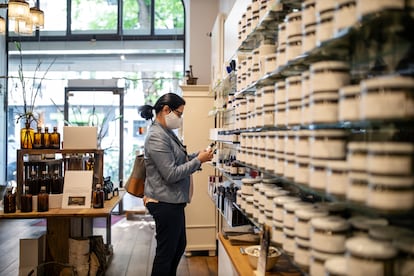The decline of homeopathy, the ‘medicine’ that doesn’t cure anything
Thanks to the efforts of scientific activists, this pseudoscience, whose efficacy has never been proven, is losing ground

In the more than 200 years that have passed since its invention, no one has been able to prove that homeopathy is actually capable of curing anything with its alleged medicines that have no active ingredients. However, its reputation has changed a lot in that time. It has been financed by public health services in countries such as France — although it stopped doing it in 2021. At the beginning of this century its use was growing among those who sought alternative medicines, but years of scientific activism against this pseudoscience, as well as a somewhat more rigid regulation, have contributed to a collapse in sales.
To understand this phenomenon, EL PAÍS reached out to some of its main promoters, such as the pharmaceutical company Boiron, leader in the sector; the Spanish Association of Homeopathy Pharmacists and the Spanish Society of Homeopathic Doctors. In the absence of a response from all three, the explanations are given by experts who are more critical of the discipline.
In general, it dates back to the beginning of the last decade. A skeptical movement with growing prominence worked to denounce that the principle on which homeopathy is based not only had neither head nor tail, but it had never produced any solid evidence of improving anything. This was reflected in an editorial entitled The end of homeopathy that appeared in The Lancet magazine in 2005, which suggested society should stop wasting time and money trying to prove the effectiveness of a therapy that had not been able to do so in two centuries. “The more dilute the evidence for homeopathy becomes, the greater seems its popularity,” the editorial stated, ironically.
The authors were referring to the very foundations of this pseudoscience, which postulates that what produces symptoms of something can cure that same thing if it is highly diluted in water. For one thing, this has not been proven (except, in a certain way, for allergies). Additionally, the preparations they sell are so diluted that they are the equivalent of throwing a drop of a substance into all the oceans of the planet. There is simply no trace of active ingredients in homeopathic medicines.
Many people who used to consume homeopathy were not even aware that this was the case. Fernando Frías, one of the activists who worked to undermine the discipline’s remaining prestige, recalls that people did not believe them when they were told that compounds with diluted Berlin Wall were sold to overcome the feelings of oppression and anxiety. This was actually commercialized under the premise that “like cures like”: if the Berlin Wall oppressed, a piece of it diluted in water should remedy it. “Many were under the impression that it was just a natural therapy and that we were making things up to attack it,” says Frías. He and other disseminators took part in homeopathic suicides, which consisted of ingesting alleged sedatives in enormous quantities without suffering any effect.
Despite everything, the sale of homeopathic remedies is widespread. They can be found in drugstores, health food stores, and online retailers. The law allows it. There has been a lot of debate about how to regulate an alleged drug whose only effect is, in truth, the placebo effect. In 2001, the European Parliament issued a directive that covered its use in countries with a homeopathic tradition; sources explain that this happened due to the pressure exerted by both the industries and the governments of countries where pseudoscience is deep-rooted, such as France (where Boiron is headquartered) or Germany, where its consumption is much higher than in others, such as Spain.
“Having regard to the particular characteristics of these homeopathic medicinal products, such as the very low level of active principles they contain and the difficulty of applying to them the conventional statistical methods relating to clinical trials, it is desirable to provide a special, simplified registration procedure for those homeopathic medicinal products which are placed on the market without therapeutic indications in a pharmaceutical form and dosage which do not present a risk for the patient,” states the directive.
In its more than two centuries of history, this is not the first time that homeopathy loses ground. Still, Frías warns, it cannot be ruled out that at some point something will come up that will make it fashionable again. “Look at the example of chemtrails [the condensation trails left by airplanes that some conspiracy theorists believe are a way of poisoning the population from the air]. It seemed that no one remembered them anymore, but now they’re back,” he says. Frías cites the astrophysicist and disseminator Javier Armentia, who states that beliefs are like a rubber duck: no matter how much they sink, they always resurface. “Especially if there is money behind,” he adds.
Sign up for our weekly newsletter to get more English-language news coverage from EL PAÍS USA Edition
Tu suscripción se está usando en otro dispositivo
¿Quieres añadir otro usuario a tu suscripción?
Si continúas leyendo en este dispositivo, no se podrá leer en el otro.
FlechaTu suscripción se está usando en otro dispositivo y solo puedes acceder a EL PAÍS desde un dispositivo a la vez.
Si quieres compartir tu cuenta, cambia tu suscripción a la modalidad Premium, así podrás añadir otro usuario. Cada uno accederá con su propia cuenta de email, lo que os permitirá personalizar vuestra experiencia en EL PAÍS.
¿Tienes una suscripción de empresa? Accede aquí para contratar más cuentas.
En el caso de no saber quién está usando tu cuenta, te recomendamos cambiar tu contraseña aquí.
Si decides continuar compartiendo tu cuenta, este mensaje se mostrará en tu dispositivo y en el de la otra persona que está usando tu cuenta de forma indefinida, afectando a tu experiencia de lectura. Puedes consultar aquí los términos y condiciones de la suscripción digital.









































